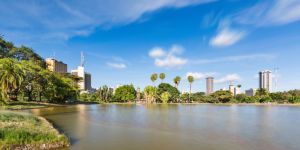Its quite difficult for me to comment on some of these, as I don't really live the expat lifestyle, but here goes:
Property rental: anything upwards of around Ksh 60 - 70,000 per month for an apartment, possibly with the addition of service/security charges. Its not unusual for rent to be paid 3 months in advance, plus a months deposit. Repainting at the end of your tenancy is often part of the contract.
Public transport: Matatu (14 seat minibus) fares depend on how far you are going, maybe 50 or 60 shillings - I don't really know for sure, as I don't use them. Taxi, for example approx Ksh 2000 from the airport to Nairobi city centre. Bus services are fairly limited, as are train services. There is no subway, or tram.
Food: we tend to eat local food, which is much cheaper than a western diet and we grow some of it. We spend perhaps Ksh 6000 - 8000 per week on groceries for the family plus 2 dogs. We also feed the two workers. Bread; Ksh 50 - 150 per loaf, pasta; around Ksh 100 for a packet of spaghetti, rice maybe around Ksh 300 for 2kg. Imported food is expensive, e.g. a box of Kelloggs cereal will cost in the region of Ksh 500. Shopping in markets is cheaper than supermarkets.
School: the cost varies widely. International schools cost more, possibly around Ksh 150,000 to 200,000 per term. Kenyan 8-4-4 schools are considerably cheaper.
Fuel: Petrol (gas) around Ksh 100 per litre, Diesel around 90 Ksh per litre. Prices have recently risen.
Energy (home): Electricity, we pay about 4000 to 7000 shillings per month. Water; very variable depending upon where you live, but water usage is metered. Cooking gas; we pay Ksh 2100 for a replacement 13kg cylinder, which lasts about 2 months. The cost of purchasing the cylinder and regulator in the first place is something in excess of Ksh 5000.
Medical: Again varies according to area. In Nyeri a consultation costs around Ksh 1500 and Ksh 1000 thereafter. In Nairobi its considerably more, possibly Ksh 3000 - 4000. Tests will cost several 000 shillings (all depending on the test required). Doctors will charge a further fee for giving the results. An MRI costs Ksh 18,000 to 20,000 (possibly more). An ultrasound scan maybe around Ksh 4000. Medication varies in cost, but can be expensive. If you regularly take prescription medication, you can just buy your medication from a pharmacist without having a consultation with a doctor to renew a prescription. Private hospital care is very expensive and a large upfront payment (I think around Ksh 100,000) is required for a private admission. Health insurance makes sense. Public health facilities are overstretched and overcrowded - the best healthcare is in the private sector.
Internet/phone: Depends on the amount of calling! Internet Ksh 1000 for 3gb data.
 Marriage in Kenya
Marriage in Kenya Leisure activities in Kenya
Leisure activities in Kenya Requirements for Foreigners to Live and Work in Kenya
Requirements for Foreigners to Live and Work in Kenya Moving with your pet to Kenya
Moving with your pet to Kenya Driving in Kenya
Driving in Kenya Study in Kenya
Study in Kenya kenya (yetu)
kenya (yetu) Registering company branch in kenya
Registering company branch in kenya
 Mine writes it as Matte.
Mine writes it as Matte.

